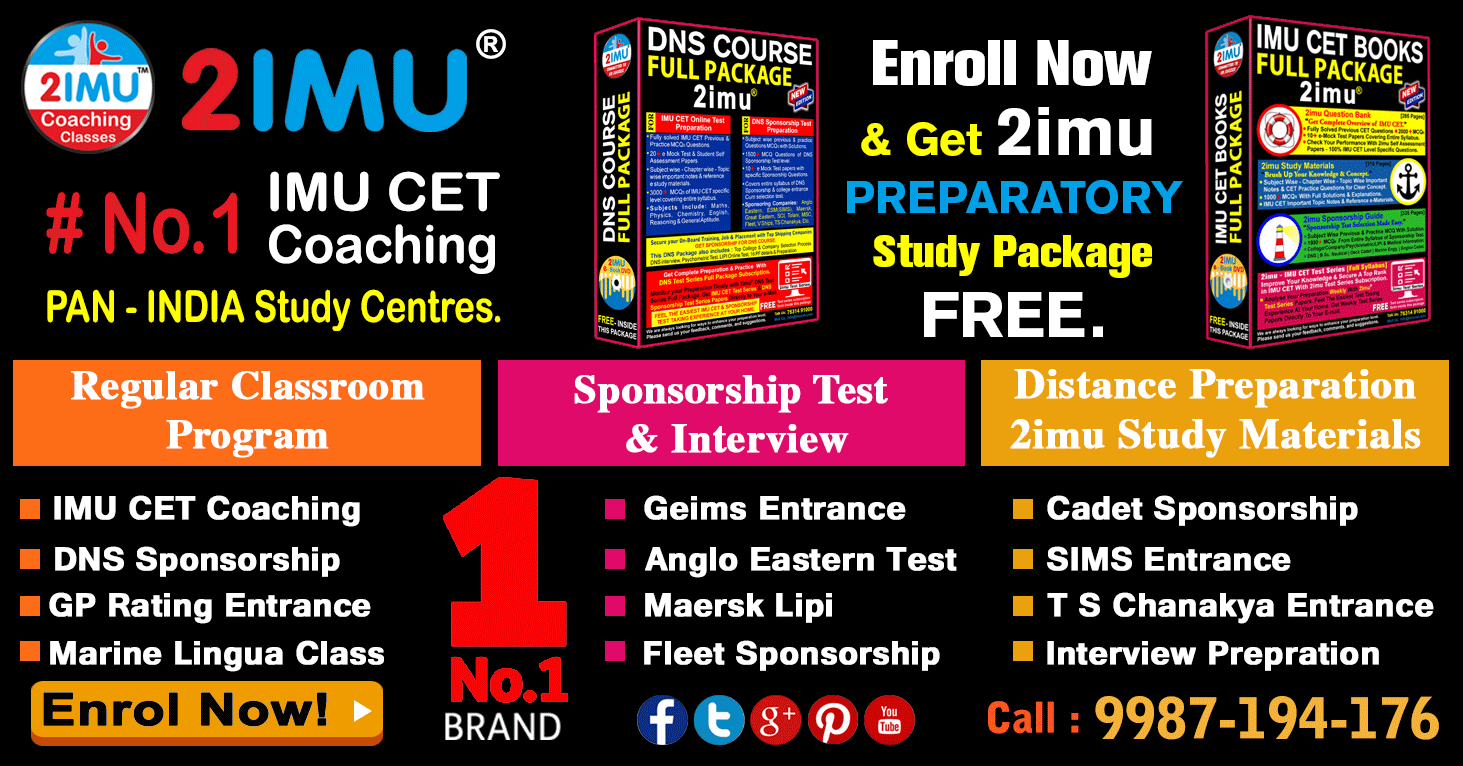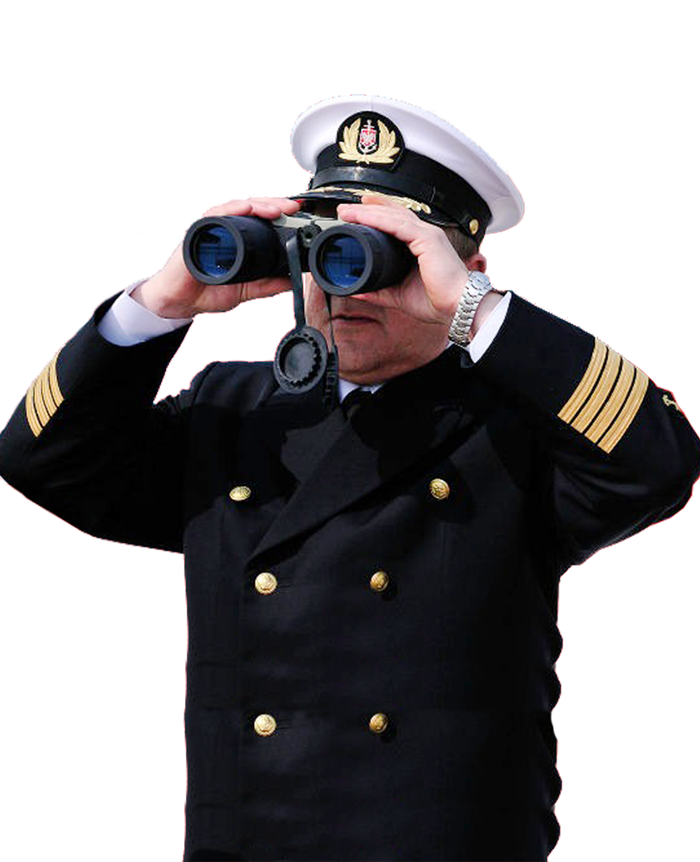All admissions to the various UG and PG programmes of the IMU and its Affiliated Institutes will be through All-India Common Entrance Tests (CETs) conducted every year 2 times, usually in the month of January and June.
There will be a CET common to all UG Programmes.
1. B.Tech (Marine Engineering)
2. B.Tech (Naval Architecture & Ocean Engineering)
3. B.Sc (Ship Building & Repair)
4. B.Sc (Maritime Science)
5. B.Sc (Nautical Science)
6. Diploma in Nautical Science leading to B.Sc. (Applied Nautical Science)
There will be a CET common to the 2 MBA programmes; another CET common to the 2 M.Tech programmes; and yet another CET for the programme. The results of the CETs are valid for the particular Academic session only.
1. MBA (Port and Shipping Management)
2. MBA (International Transportation and Logistics Management)
3. M.Tech (Naval Architecture and Ocean Engineering)
4. M.Tech (Dredging and Harbour Engineering)
Application Fee is Rs.1000 for General candidates and Rs.700 for Scheduled Caste/Scheduled Tribe candidates.
The Syllabus for CET for UG programmes will be Physics, Mathematics, Chemistry, English, General Knowledge and Aptitude at Plus 2 level (CBSE, ISE and State Boards).
The Syllabus for the CETs for PG programmes will be as follows:
For the 2 MBAs – i) Quantitative ability, ii)Data interpretation, iii) Verbal ability and iv) Logical reasoning
For the 2 M.Techs – English, General Knowledge, Aptitude, Mathematics and Engineering.
The questions will be of multiple choice type. Candidates who are shortlisted based on CET scores will be called for Counselling at designated IMU Campus(es) and will involve verification of original mark sheets and certificates, physical fitness clearance, and allotment of seats in the IMU Campuses or Affiliated Institutes.
N.B Admissions to Diploma in Nautical Science leading to B.Sc. (Applied Nautical Science) programme in Affiliated Institutes are open only to ‘sponsored candidates’, i.e. candidates sponsored by Ship Owning or Managing Companies who qualify in IMU’s CET for UG programmes.
Eligibility Criteria
Qualification: Pass/ appearing in 10+2 examination from a recognized Board/ University with Physics, Chemistry and Maths (PCM), with not less than 60% marks in PCM.
OR with Physics as an individual subject in one of the years of B.Sc. in PCM or Electronics with an average of not less than 50% marks from an UGC/DEC recognized university.
OR B.E./ B.Tech. Degree from college recognized by AICTE.
1. Age Limit
Age as on the date of admission on 1st August 2015 shall be as follows:
i) Minimum age 17 years
ii) Maximum age 25 Years
Note: For Scheduled Castes (SC) & Schedule Tribe candidates (ST) Candidates maximum age relaxation is for five (5) years.
2. Reservations of Seats
For SC candidates – 15% Quota
For OBC candidates – 27% should be part of Non Creamy layer
For ST – 7.5%
For DA candidates – 3%
Note: Any candidate who is applying for the reserved category should have valid caste certificate as per government of India.
3. Physical Fitness
Candidate for admission to marine courses (DG, Shipping-approved courses) are required to produce certificate for medical fitness by authorities authorized by Director General of Shipping.
4. Eyesight
a) Candidates joining DNS, B.Sc. (Nautical Science) & B.Sc. (Maritime Science) degree course are not allowed to wear glasses and their vision should be 6/6 (normal) in each eye separately.
b) In case of candidates joining B. Tech. (Marine Engineering) degree course, glasses may be allowed but eye sight in each eye beyond plus/minus 2.5 will be rejected. Unaided vision should be 6/12 in both eyes minimum or 6/9 in the good eye and 6/12 in the other eye minimum.
Syllabus Of IMU CET
These five subjects are as follows:
- English 40 questions
- General Aptitude 40 questions
- Mathematics 50 questions
- Physics 50 questions
- Chemistry 20 questions
Physics
Gravitation, Electromagnetic Induction and A.C., Electrons and Photons, Radioactivity, Semiconductors, Heat Radiation, Wave Motion and Sound, Fluids, S.H.M., Rotational Motion of a Rigid Body, Magnetic Effects of Electric Current, Current Electricity, Electrostatics, Ray Optics, Wave Theory etc.
Chemistry
Nuclear and Radio Chemistry, Halogen Derivatives of Alkanes and organic hydroxy Compounds, Chemistry of Transition and Inner Transition Elements, Electro-chemistry, Chemical Thermodynamics and Energetic, Nature of Chemical Bond II, Adsorption and Colloids, Carbohydrates, Proteins and Fats, Chemical Kinetics, Coordination Chemistry etc.
Mathematics
Probability, Boolean algebra, linear in equations, limits and continuity, vector and 3-d geometry, matrices, statics & dynamics, indefinite integrals, definite integrals & its application, differential equations, etc.


